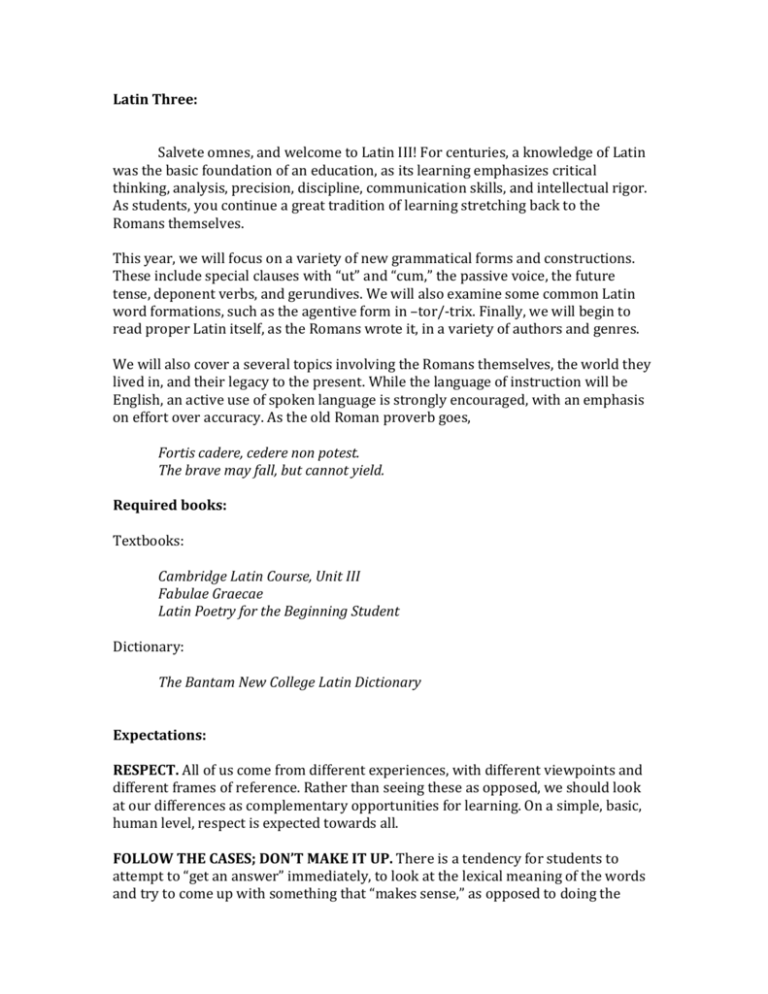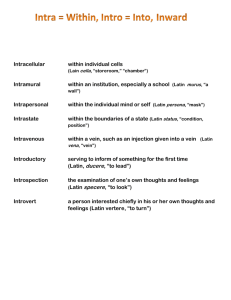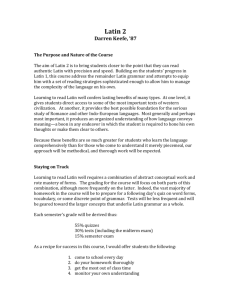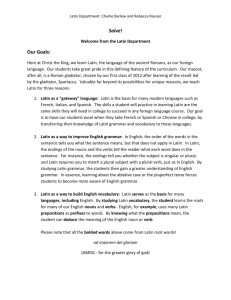Latin III Course Description
advertisement

Latin Three: Salvete omnes, and welcome to Latin III! For centuries, a knowledge of Latin was the basic foundation of an education, as its learning emphasizes critical thinking, analysis, precision, discipline, communication skills, and intellectual rigor. As students, you continue a great tradition of learning stretching back to the Romans themselves. This year, we will focus on a variety of new grammatical forms and constructions. These include special clauses with “ut” and “cum,” the passive voice, the future tense, deponent verbs, and gerundives. We will also examine some common Latin word formations, such as the agentive form in –tor/-trix. Finally, we will begin to read proper Latin itself, as the Romans wrote it, in a variety of authors and genres. We will also cover a several topics involving the Romans themselves, the world they lived in, and their legacy to the present. While the language of instruction will be English, an active use of spoken language is strongly encouraged, with an emphasis on effort over accuracy. As the old Roman proverb goes, Fortis cadere, cedere non potest. The brave may fall, but cannot yield. Required books: Textbooks: Cambridge Latin Course, Unit III Fabulae Graecae Latin Poetry for the Beginning Student Dictionary: The Bantam New College Latin Dictionary Expectations: RESPECT. All of us come from different experiences, with different viewpoints and different frames of reference. Rather than seeing these as opposed, we should look at our differences as complementary opportunities for learning. On a simple, basic, human level, respect is expected towards all. FOLLOW THE CASES; DON’T MAKE IT UP. There is a tendency for students to attempt to “get an answer” immediately, to look at the lexical meaning of the words and try to come up with something that “makes sense,” as opposed to doing the work of following the cases and the rules. As your teacher, I am more interested in the process than the answer. Translate according to case and the rules, not according to “what makes sense.” This is the fundamental difference between English and Latin, and it cannot be emphasized enough: translate according to case, nothing else. KNOW YOUR ENDINGS. PERIOD. Students are responsible for knowing their noun and verb endings, as we learn them, period. This will be heavily reviewed in the beginning of the year. KNOW YOUR VOCABULARY, INCLUDING PRINCIPLE PARTS. Vocabulary is to be memorized along with its principle parts, and parts of speech. This is important for two reasons: 1) it tells you what endings to stick onto what nouns, and 2) it tells us the difference between nouns and verbs that might look the same in English. For example, there is a difference between the noun lex, legis, f. – rule (as in, “I know the rule”) and the verb rego, regere, rexi, rectus – to rule (as in, “I rule the kingdom”). COMPLETE ALL HOMEWORK ASSIGNMENTS, ON TIME, WITH EFFORT. Homework is to be completed on time and according to the instructions of the assignment. Credit will be given for effort more than for accuracy – do not be afraid to make mistakes, or to be creative! The philosophy of this class is that homework is where you try things out, class is where things are corrected, and tests are where you must get it right. We learn from our mistakes; do not be afraid to make them. ASK QUESTIONS, ASK QUESTIONS, ASK QUESTIONS! We learn through our own, personal investigation. If you are confused, interested, lost or intrigued, ask questions, and do not be afraid to ask questions, no matter how basic a question may seem. One of the distinct advantages of a Latin education is that it forces us to questions how we ourselves make and transmit meaning to others – these are essential questions that can drive our learning to new and intellectually rewarding heights. Grading: Projects – 15 % Homework – 15 % Quizzes – 30 % Tests – 30 % Class Participation – 10%











